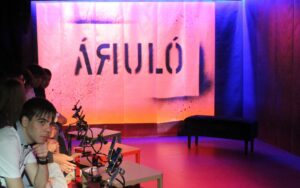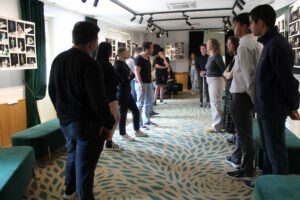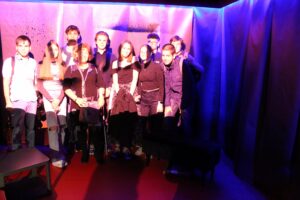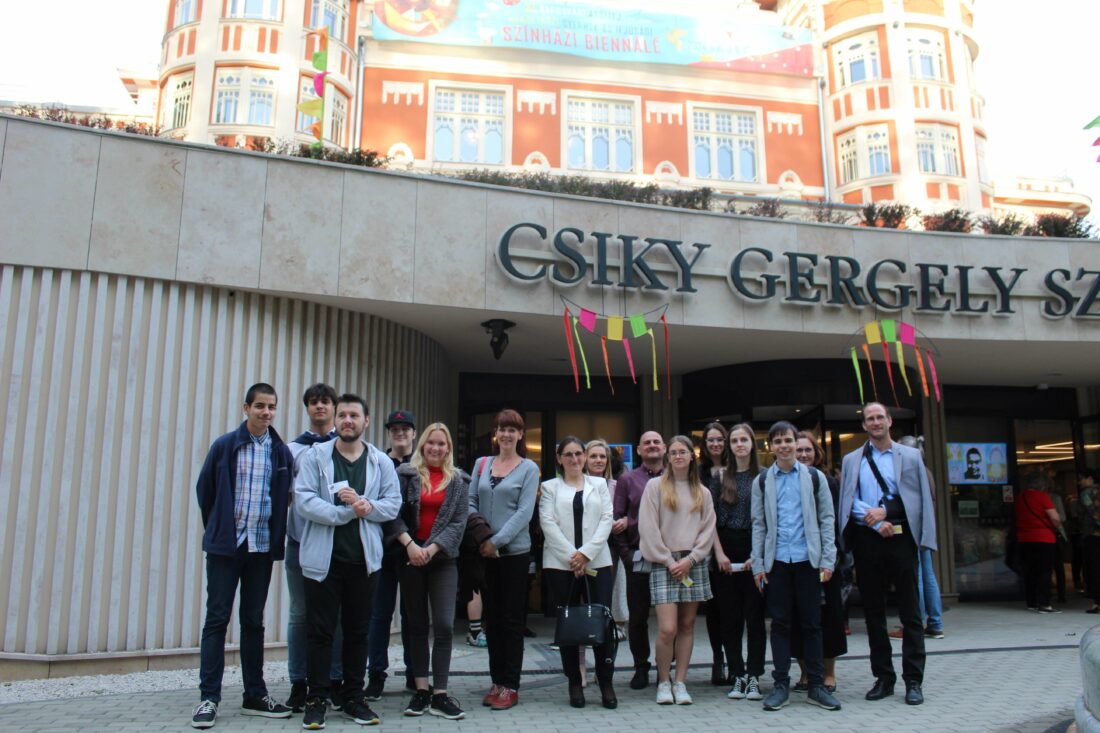
Theater Tour in Kaposvár
As a generous reward after our portfolio defense, we experienced with our group several performances at the 11th Kaposvár Assistej International Children’s and Youth Theatre Biennial, which our Csiky Gergely Theater has been hosting for years. As before, there were performances that our entire group watched together, with parents, educators, and university classmates joining us. I always introduce the programs to our group, and based on this, we were free to decide what we wanted to see. Our choices were influenced by our taste and interests. So, in smaller or larger groups, we attended six performances of the Biennial: Krisztina Tóth’s Gypsy tale written from a short story, “A lány, aki nem beszélt” telling a beautiful story about belonging. The Budapest Puppet Theatre’s play “Nem félünk a sötétben” conveys a philosophical message about the journey of humans (in this case, teenagers) in search of true connections. The “Felejthetetlen” is a theater education program intertwined with the performance explored the theme of intergenerational communication, contrasts, and problems. “Mirad, egy fiú Boszniából”, bluntly and vulnerably confronted us with the horrors of war from the perspective of a thirteen-year-old boy. The stage adaptation of the cult film “Holt költők társasága” promised to be a real treat, and “Áruló” one of our favorites, followed by a discussion not free of debates. Below, we summarized our experiences at the performances:
The first and only main stage performance was the famous film’s stage adaptation of “Dead Poets Society.” The performance captivated not only us but also Zoli, our drama teacher from Pécs, our dear and beloved acquaintance. We applauded together with great joy and satisfaction. For those who have seen the film, the major dramaturgical points nicely followed the familiar story, yet shed new light on human relationships in the “here and now.” It provided catharsis even for those who had not seen the story on the big screen. We pondered on what the performance meant to us, how relevant it is to the educational system today. And we talked at length after the performance on the beautiful spring evening about responsibility, the indicators of our choices and decisions, or even the simple and versatile sets. But there was also a discussion – and this sparked some debate between those who had seen the movie and those who hadn’t – that the character played by the lead actor was weaker in the stage version. Neil in the film is a more defining personality, more exciting, more complex. Here, we got a somewhat duller performance. Those who hadn’t seen it on the big screen will surely seek it out on one of the streaming platforms, that’s for sure.
Sarolta Kovács Nagy
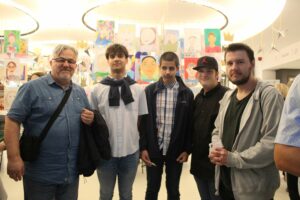
Nem félünk a sötétben (We’re not afraid of the dark) is a genuine teenage story aimed at teenagers. It portrays a depressing, desperate, misunderstood, boring, lonely feeling of life, where the good things – and how good they are! – need to be listed to give strength and a smile. Divorced parents – where the mother is somewhat scattered and desperately looking for men, and the father, conspicuously happy with his new family – a burnt-out teacher, shallow friends and classmates, a deceased beloved singer. In such an environment, the life of a real teenage girl, for whom music and dreaming are an escape, is depicted. The teenagers’ inner world and life are portrayed brilliantly, in slang, in extravagant costumes, grotesquely exaggerated, one might say significantly exaggerated, caricatured. What I found great were the costumes: each character was portrayed, “dressed up” almost literally, through the eyes of the main girl, and the costume was also an exact mirror of the character’s personality.
Eszter Sárközi
A lány, aki nem beszélt (The gril who didn’t speak): The stage adaptation of Krisztina Tóth’s tale is about adoption, the need to know biological parents, and the lives of forest Gypsy people. Beautiful stage design, incredibly ingenious (not an exaggeration to use the word brilliant) puppets made the performance magical for me. A very serious topic was brought to the stage, and since it was rated “8+,” it was done in a kind, humorous, musical way, with wonderful puppets and puppeteers. We had the opportunity to admire the puppets up close at the end of the performance, and we couldn’t miss it!
Eszter Kovács
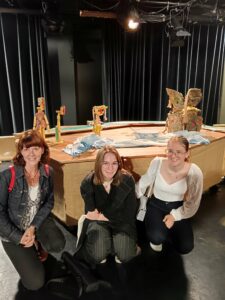
Felejthetetlen (Unforgettable): Communication between generations, conflicts, and problems between generations. After an introductory session, the performance took place, during which we had a glimpse into the life and home of a family, experiencing what it’s like to be a grandmother, a middle-aged man, a high school senior, and his girlfriend, who is already a university student and is preparing to go abroad, and trying to have lunch together. Incredible, real, current, familiar situations, dialogues came to life before us, which of course we could laugh at, but at the same time, our stomachs tightened more and more. The end is not the end, it just stops the piece so that it is followed by another drama pedagogy session. This is recommended for everyone, young, middle-aged, and old. It’s very strange to see how differently we experience the same situation, and I really liked that turquoise appears in the costumes, sets, almost like a single color on everyone and everything, because after all, we’re all in the same boat. I am grateful to the Foundation that as a parent, I could take a different perspective on the adult-teen dialogue, not to mention that I did it with our group’s youth.
Ildikó Árok-Vörös
Mirad, a Bosnian boy whose story is told by his aunt and uncle, bluntly and naturally depicts the horrors of war. As a drama teacher and theater enthusiast, I feared for ourselves, the viewers. This performance was extremely emotionally draining, and although it had a great impact on me, unfortunately, there was no question left in me, I had nothing to think about, I just rejected, distanced myself from what I saw, heard – the horror of war. And this also left a void in me, in us, because we all prefer performances that prompt further thought in their themes; which, through taboo-free topics using the tools of theater, provide security as a recipient, do not tear apart, do not make me feel defenseless (and I don’t like sensational solutions for a moment). However, of course, there remained a commitment to good performances, and for a moment, we didn’t regret seeing this performance either.
Angéla V. Sárközi
Our favorite was the performance titled “Áruló” (Traitor) by the Kolibri Theater, which made us think and sparked a debate about what is more important: security or freedom? Which side should we choose, the observation providing protection or the uncertain future full of dangers? This theater experience was completely unconventional for me; the space, the arrangement were different, we turned off our own phones (even achieving this isn’t easy nowadays, not even for teachers and our parents!), of course, we received another one in return, on which we had to make decisions. Based on the result of the vote, the protagonist actor playing the innocent pizza delivery boy embroiled in a conflict continued the story. (By the way, I and several others from the group saw him in another performance at our poetry festival). The interactive performance was truly dynamic, exciting, investigative, thought-provoking, full of decisions, absolutely unconventional, both in terms of the set and the course of the performance. We shaped the story, and then we had a lively debate about the questions raised in the play during the post-performance discussion, which was held just for us. I had a great time.
Barnabás Radó
